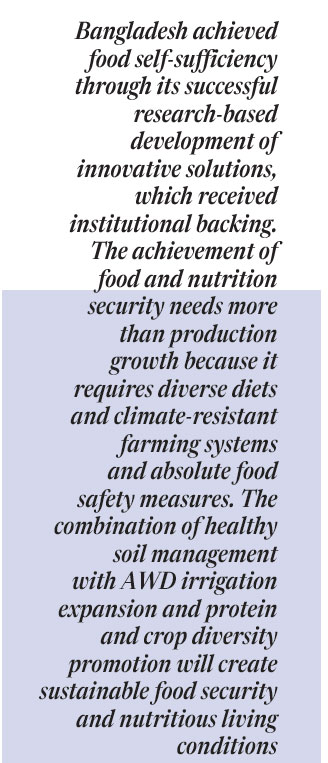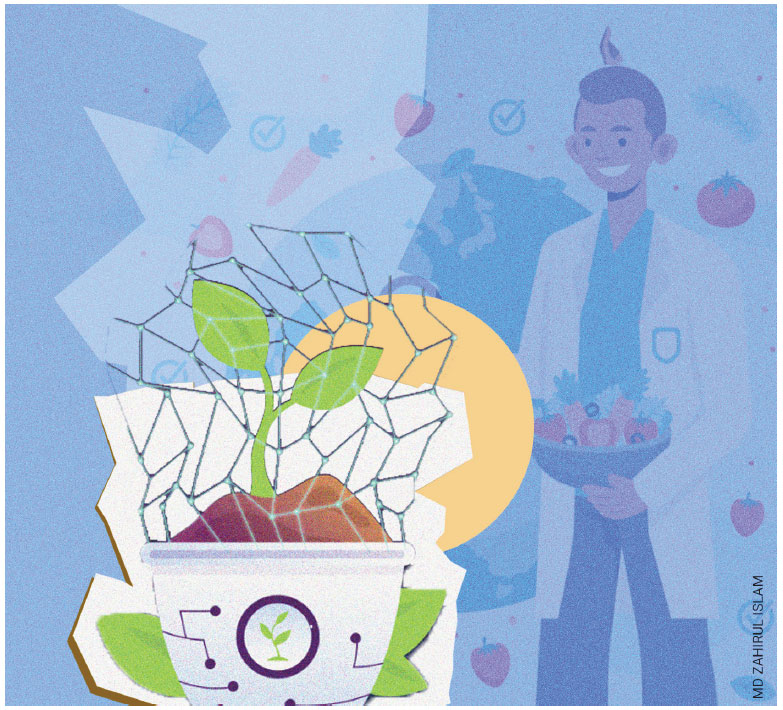
JIBAN KRISHNA BISWAS
The path towards achieving food security from famine has brought positive results to Bangladesh throughout its historical development. The nation experienced its most critical food shortage in 1974, which resulted in numerous deaths. The period following 1974 brought substantial advancements to agricultural research and development activities. The Green Revolution launched its high-yielding varieties (HYV) of wheat and rice during the early 1970s to combat hunger among millions but ignored existing resource limitations. With time, the production levels have increased, but the country has not established food security yet. The four essential components of food security, which include availability, access, utilisation and stability, need complete achievement to reach food security.
Hidden Hunger in Bangladesh: The daily calorie needs of Bangladeshis reach 2,393 kilocalories per person while exceeding the FAO minimum of 2,200 kcal. The total amount of calories people consume shows an unbalanced distribution between different food groups. The majority of these calories come from rice, totalling 70% of intake. The protein and fat content in the diet remains at very low levels. The insufficient intake of protein-rich foods, including pulses, meat, milk, eggs and fish, leads to hidden hunger because people lack essential micronutrients despite consuming enough calories. The body requires iron, zinc and vitamin A to support normal growth and productivity. Research indicates that 28% of children under five years old suffer from stunted growth, while 8% experience wasting, and 22% of women in their reproductive years are underweight. The prevalence of iron deficiency anaemia affects approximately 40% of both reproductive women and children in the country.
The solution to nutritional imbalance requires dietary diversification, which enables people to access protein sources. The achievement of true food and nutrition security in Bangladesh requires increased knowledge about nutrition-sensitive agriculture practices.
From Shortage to Sustainability: The transition from food scarcity to sustainable food systems has occurred in Bangladesh since its independence. The government of Bangladesh imported food and received foreign assistance to fulfil domestic requirements throughout the 1970s and 1980s. The nation struggled to support its population because of natural disasters, poor agricultural management of sensitive ecosystems and low crop yields. The introduction of high-yielding rice and wheat varieties, expanded irrigation systems and fertiliser use marked a pivotal moment: designated as the Green Revolution for Bangladesh’s agricultural development. The Green Revolution started in Bangladesh, which brought higher agricultural yields, decreased hunger and enhanced the rural standard of living. Bangladesh now ranks as the world’s third-largest rice producer behind China and India, producing more than 40 million tonnes of clean rice annually. The nation has made enormous progress since the time of food shortages in the past. However, the country now faces different types of challenges. The combination of urbanisation-driven land loss, water scarcity and climate change effects, such as salinity, unpredictable rainfall and flooding, threatens the sustainability of agricultural production. The increasing prices of seeds, fertiliser and fuel create additional pressure on small and marginal farmers who already face challenges.
Research and Development: Bangladesh needs to direct its efforts towards developing high-quality food systems, which will provide both sufficient food and nutritious food for its population. The National Food and Nutrition Policy (2019) set five main objectives: ensuring the availability of safe and nutritious food, improving access to affordable food, enhancing the consumption and utilisation of healthy diets, increasing access to nutrition-sensitive social protection and strengthening the governance of food and nutrition security. A sustainable and nutrition-secure future for all citizens will emerge through research-based partnerships among scientists, policymakers, farmers and international organisations. The Bangladesh Rice Research Institute (BRRI) has produced more than 100 high-yielding rice varieties, including climate-resistant and micronutrient-enriched types that enhance national food security levels. The Bangladesh Agricultural Research Institute (BARI) has developed over 500 high-yielding varieties of vegetables, pulses, oilseeds, tubers, fruits and spices, ensuring food and nutritional security. It has also introduced climate-smart technologies like drip irrigation, conservation agriculture and stress-tolerant crops, boosting productivity, etc. The Bangladesh Institute of Nuclear Agriculture (BINA) uses irradiation technology to create stress-resistant crops with enhanced nutritional value, including zinc-enriched and iron-enriched rice varieties.
The Bangladesh Institute of Research and Training on Applied Nutrition (BIRTAN) connects agricultural production with nutritional needs by developing nutrition-sensitive farming practices and educational programmes, which guarantee better dietary outcomes from increased food production. The Bangladesh Livestock Research Institute (BLRI) and Department of Livestock Services (DLS) have introduced innovative methods for meat, dairy and poultry farming, which boost protein availability and improve rural economic conditions. The Bangladesh Fisheries Research Institute (BFRI), together with the Department of Fisheries (DoF), has expanded aquaculture through research on fish breeding and feed development and disease management, which now supplies 60% of the country’s animal protein.
The Bangladesh Agricultural Development Corporation (BADC) supports productivity through its efforts to deliver high-quality seeds, fertilisers and irrigation equipment. The organisation established a research division, which focuses on seed enhancement alongside fertiliser and water management optimisation. BADC distributes foundation seeds (grown from the breeders’ seed from BRRI, BARI and BINA) while operating tube wells, rubber dams and solar pumps and conducting studies on seed forecasting, technology dissemination and soil and water resource optimisation. BADC delivers effective research-to-farmer extension services through its training programmes, which enable sustainable resource management.

The food security research in Bangladesh depends heavily on the agricultural and technical universities, including Bangladesh Agricultural University, Sher-E-Bangla Agricultural University, Sylhet Agricultural University, Gazipur Agricultural University, Hajee Mohammad Danesh Science and Technology University, Rajshahi University, Khulna University, Patuakhali Science and Technology University, etc. The universities work on developing resilient crops with high yields and short growth periods, while they support climate-resistant farming and conduct research in animal genetics, feed optimisation and aquaculture development. The Institute of Nutrition and Food Science (INFS) at DU conducts research on food safety, nutrition and public health while working with BRRI on developing salt-resistant rice varieties.
The non-government and private sectors have achieved substantial progress through the work of BRAC, ACI Agribusiness, Supreme Seeds, Lal Teer Seed Limited, etc. BRAC delivers agricultural, livestock and aquaculture empowerment to rural communities through its programmes, while ACI Agribusiness drives the adoption of modern farming inputs, hybrid seeds, digital farming systems and mechanised farming practices. Supreme Seeds creates agricultural products, which combine high yields with climate resistance to provide continuous food availability throughout the year. The agricultural biotechnology leader Lal Teer Seed Limited achieved two major breakthroughs by developing hybrid seeds for local conditions and completing Bangladesh’s first buffalo genome sequencing project.
Threats to Food Security: The food security system of Bangladesh depends on the combined efforts of public institutions, academic organisations and private sector entities. The institutions have led Bangladesh through a transition from famine to food security and now work towards building a sustainable climate-resilient food system with nutritional security. The agricultural sector produces greenhouse gas emissions through rice paddy methane (CH4) and livestock emissions and nitrous oxide (N2O) from excessive fertiliser application. The Reducing Agricultural Methane Programme (RAMP), operated under IFAD, promotes Alternate Wetting and Drying (AWD) irrigation technology to decrease methane emissions by 40-50% without yield reduction, thus enabling climate-resilient farming practices. The excessive application of pesticides creates dual threats to human wellness and environmental stability. The INFS (DU, 2022) research discovered that 35% of tested vegetables contained dangerous pesticide residues. The Bangladesh Food Safety Authority (BFSA) reported in 2023 that 42% of urban food products fail to meet safety requirements, leading to malnutrition and persistent health problems. The combination of environmental problems and health issues results from artificial food crises, which stem from market manipulation, weak regulations and political interference that drive up prices and limit food accessibility for poor families. To ensure sustainable food security in Bangladesh, all sectors must work together to protect farmland and restore soil health. At the same time, expanding AWD technology, enforcing food safety rules, improving market transparency and getting support from FAO, IFAD and national agencies will help build a fair and resilient food system.
Way forward: The agricultural system of Bangladesh requires a food system structure which puts rice at the core while surrounding it with fish, meat, milk, eggs, vegetables and pulses to achieve dietary balance. The country requires spreading its rice cultivation across multiple products, including pulses, fruits, vegetables, oilseeds, livestock, fish and aquaculture systems to establish nutritional equilibrium. The implementation of commodity diversification will create better nutrition while protecting against single-crop farming risks and price volatility. The development of climate-resistant agricultural methods represents a critical necessity to sustain farming output when climate change occurs. The combination of AWD irrigation systems with organic fertilisers and drought-tolerant crop selection will safeguard resources while securing agricultural stability.
Food safety maintenance stands as a vital objective for training farmers and enhancing their ability to track food products. The public also needs educational programmes that promote safe and nutritious eating habits across Bangladesh. The BFSA should expand testing facilities and strengthen monitoring systems to ensure food quality and consumer protection.
The successful implementation of data-based agricultural and nutrition policies requires the International Food Policy Research Institute (IFPRI) to work with FAO and BBS through integrated collaboration. The combination of food diversification with climate adaptation and food protection measures will enable Bangladesh to build a lasting food security system for every citizen.
Bangladesh achieved food self-sufficiency through its successful research-based development of innovative solutions, which received institutional backing. The achievement of food and nutrition security needs more than production growth because it requires diverse diets and climate-resistant farming systems and absolute food safety measures. The combination of healthy soil management with AWD irrigation expansion and protein and crop diversity promotion will create sustainable food security and nutritious living conditions. Research institutions working together with government entities, FAO, IFAD and IFPRI will establish a food system that provides safe and sufficient food for all citizens through climate and economic resilience and inclusivity.
_________________________________
The writer is a Senior Technical Consultant, Reducing Agricultural Methane Programme, Asia and the Pacific Division, International Fund for Agricultural Development

